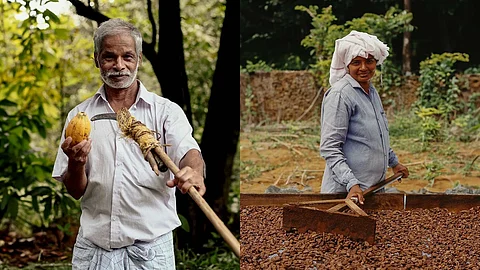
- HOMEGROWN WORLD
- #HGCREATORS
- #HGEXPLORE
- #HGVOICES
- #HGSHOP
- CAREERS
- ABOUT US
- CONTACT US

Did you know that India is the largest producer of cocoa — the primary ingredient in chocolates — in Asia? India produces as much as 27,000 tonnes of cocoa and imports USD 92.48 million of cocoa beans and other cocoa products per year, making chocolates a USD 1.82 billion market in India. With the spread of e-commerce and the rise of several bean-to-bar craft chocolate brands in the country, this figure is expected to reach USD 5.3 billion by 2032.
The British brought the cacao plant to India in 1798 by setting up eight plantations of the Criollo variety in Courtallam, Tamil Nadu. But it wasn’t until the British chocolate behemoth Cadbury established a plantation in Wayanad, Kerala, in 1965 that cacao cultivation became a serious agricultural activity in South India. In 1979, the Kerala Agricultural University started cacao research programs with the help of the World Bank to create a cultivar that could thrive in South Indian conditions. In 1987, the university tied up with Cadbury and came up with highly productive seeds in an attempt to increase yield. It was India's first public-private partnership. Over the next decades, commercial cacao plantations spread from Kerala and Tamil Nadu to the rest of South India. Today, Andhra Pradesh produces 7,700 tonnes of cocoa annually.
Naturally, several homegrown artisanal chocolate makers like Soklet, Mason & Co, and Manam Chocolate have come up in South India in recent years. These small-batch craft chocolate makers are taking the fight to commercial producers like Cadbury — once synonymous with chocolates in India. These underdogs are winning international awards in the process too.
Soklet, a tree-to-bar chocolate maker based in the Anamalai hills of Tamil Nadu, tied up with USA-based Dandelion Chocolate in 2016 to bring their products to international standards. Within a year, Soklet was able to raise the quality of their harvest significantly. So much so that they won the 2017 edition of the International Cocoa Awards at the Salon du Chocolat in Paris.
Other Indian craft chocolate makers are not far behind. Mason & Co., another small-batch bean-to-bar chocolate brand based in Auroville, near Puducherry, sets itself apart with their ethical, farmer-friendly approach to cultivating, harvesting, and processing the precious beans. Mason & Co. works closely with cacao farmers in South India, ensuring ethical practices, regenerative farming, ideal harvest timelines, and stringent roasting and fermenting techniques. Together with other Indian craft chocolate makers like All Things Chocolate and Hillwild, they are trying to build an ethical, equitable supply chain for cacao cultivation and trade in India, with an increased focus on ethical, sustainable, restorative practices.
As consumers and connoisseurs of chocolate, it's important that we talk about this part of the chocolate market and the chocolate-making process.
As chocolate became more and more popular across Europe and the world, the slow and labour-intensive process of harvesting and processing cacao beans contributed to the rise of a slave trade between the early 17th and 19th centuries. However, European chocolate makers have never adequately acknowledged and addressed this despite knowing about it since the early 1900s. Even now, as many as 2.1 million child labourers are working in cacao plantations in West Africa alone. Despite signing the Cacao Protocol to reduce child labour by 70% in the Ivory Coast and Ghana, the international chocolate industry has failed to meet its self-imposed deadlines repeatedly.
While homegrown ethically and equitably sourced, small-batch craft chocolate may not rid the chocolate industry of all its deep-rooted problems, I am glad these new age Indian craft chocolate makers are taking steps in the right direction.
Find out more about Indian craft chocolate makers here.
